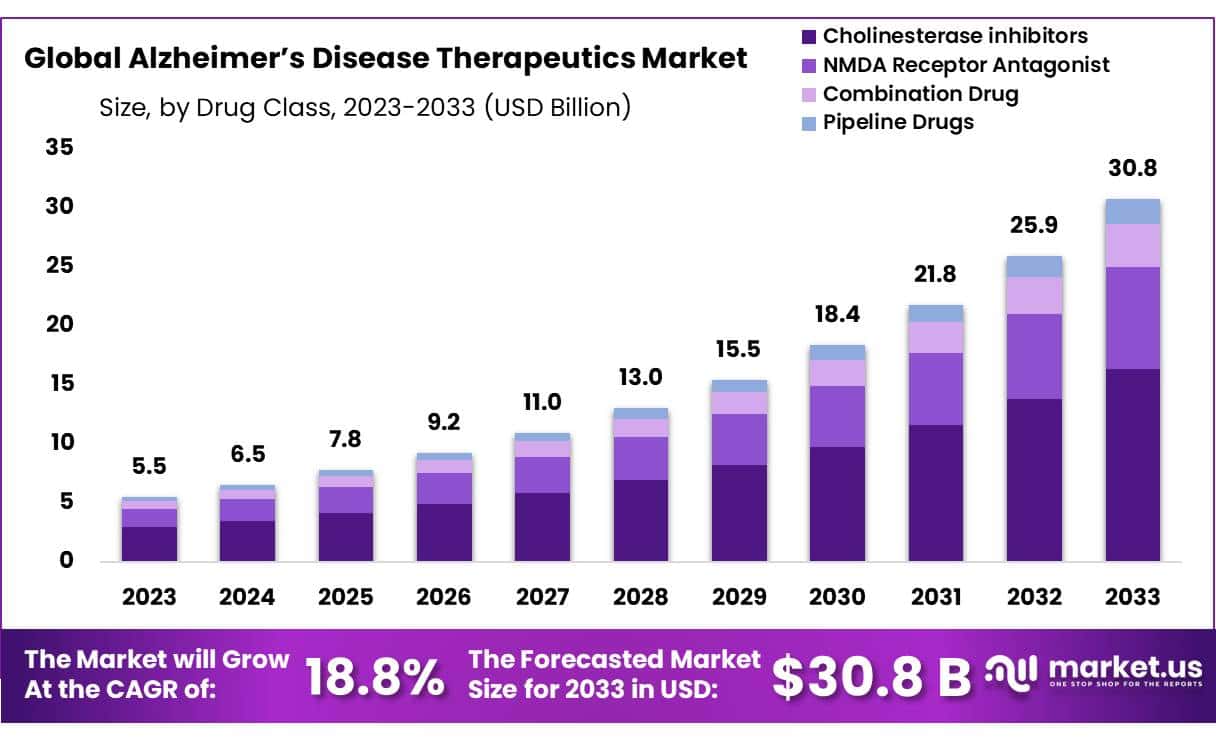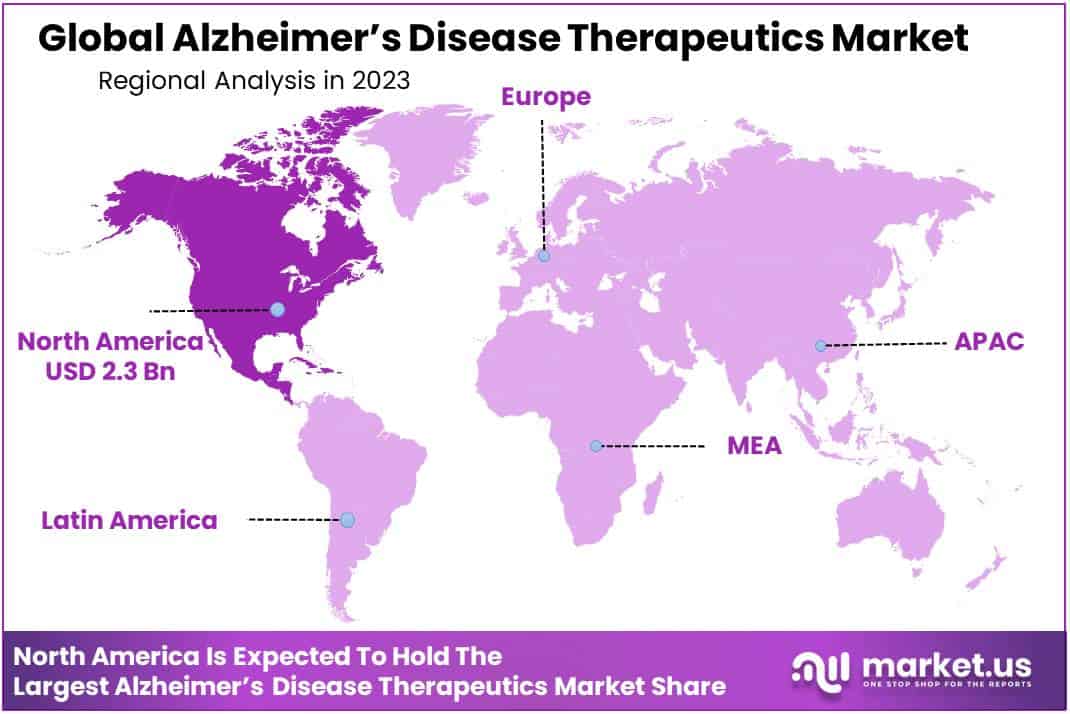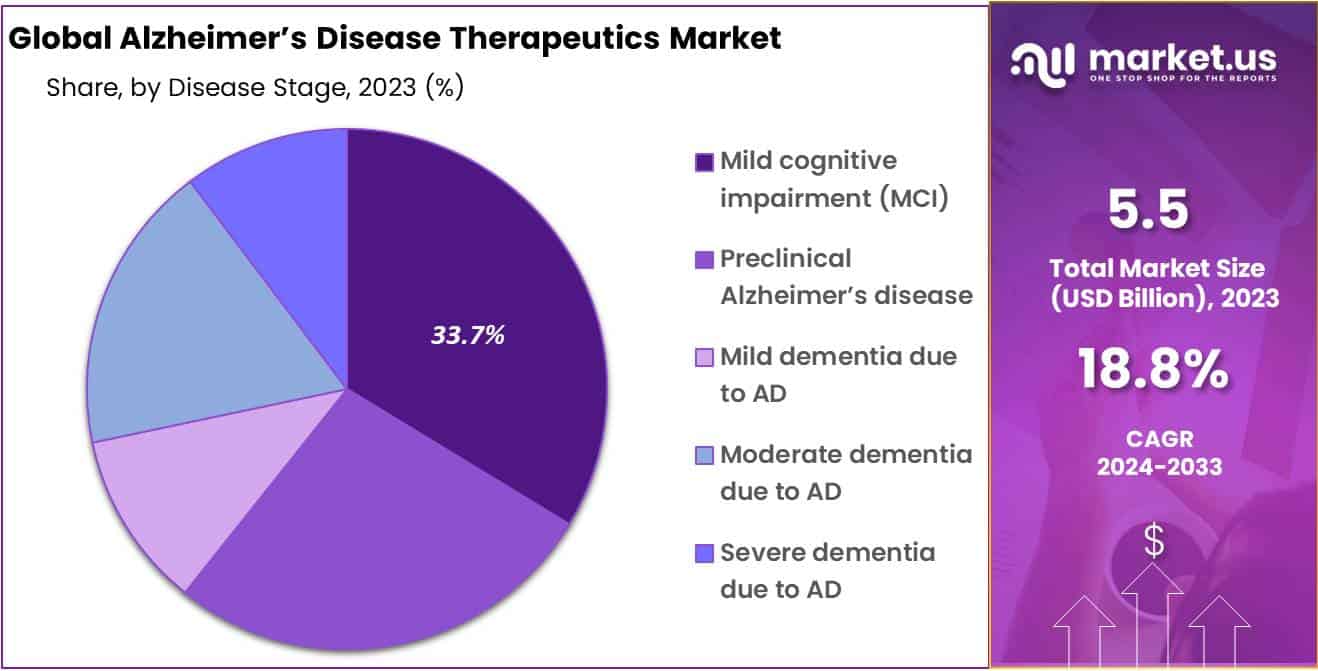New York, Jan. 30, 2024 (GLOBE NEWSWIRE) -- According to Market.us, the global Alzheimer’s Disease Therapeutics Market size is forecasted to exceed USD 30.8 Billion by 2033, with a promising CAGR of 18.8% from 2024 to 2033.
Alzheimer's is characterized as a chronic brain condition that frequently results in dementia, particularly in older individuals. It adversely affects memory, cognitive function, and disrupts daily routines. Advanced age is a significant factor in increasing the likelihood of developing this condition. Specific genes, with the APOE-e4 allele being the most notable, have been associated with the disease. Other risk factors involve cardiovascular disease, high blood pressure, diabetes, stroke, and conditions related to vascular health. Notably, there is no singular test for diagnosing Alzheimer's disease.
To Gain greater insights, Request a sample report @ https://market.us/report/alzheimers-disease-therapeutics-market/request-sample/

Key Takeaway
- In 2023, cholinesterase inhibitors stood out as the leading drug class for Alzheimer's treatment, commanding 53.2% of the market.
- Mild cognitive impairment (MCI) emerged as the most prevalent disease stage.
- The primary route for administering Alzheimer's drugs was oral, constituting the majority of the market.
- Hospital pharmacies claimed the largest share among distribution channels, securing 56.4% of the market in 2023.
- North America dominated the global Alzheimer's disease therapeutics market with a substantial 42.5% revenue share.
- Asia-Pacific is anticipated to experience exponential growth, showcasing the highest CAGR and signaling a dynamic shift in the global market landscape for Alzheimer's therapeutics.
Factors affecting the growth of the Alzheimer’s Disease Therapeutics market
- The market for Alzheimer’s Disease Therapeutics is accelerated by the rising geriatric population.
- Technologically advanced diagnostic techniques have aided in the growth of the market.
- The complex pathology of Alzheimer’s disease has negative impacts on the efficacy of the treatment. This ultimately hampers the growth of the market.
- The clinical trials for Alzheimer’s have high failure rates, which may create hindrances in the process of market expansion.
- The development of biomarker technologies has propelled the growth of the market.
Top Trends in the Global Alzheimer’s Disease Therapeutics Market
- Immunotherapy, a treatment approach utilizing the body's immune system to target and eliminate harmful substances, such as beta-amyloid plaques in Alzheimer's disease, represents a significant advancement. A notable immunotherapy drug, Aducanumab, has garnered attention for its potential in clearing beta-amyloid plaques. Ongoing research in the field is focused on refining aspects like dosing, delivery methods, and patient selection criteria for immunotherapies.
- Additionally, digital tools such as cognitive assessment apps, wearable devices, and remote monitoring systems offer the capability to remotely track cognitive decline and other symptoms. These technologies provide real-time data that can be leveraged to personalize treatment plans and assess the effectiveness of interventions over time, marking a promising intersection of medical innovation and digital healthcare solutions in Alzheimer's disease management.
Market Growth
The global Alzheimer's Disease Therapeutics Market is witnessing robust growth driven by a combination of factors. The escalating aging population, particularly in developed nations, is contributing to a rising prevalence of Alzheimer's disease. Advances in diagnostic tools, neuroimaging, and molecular biomarkers are enabling earlier and more accurate diagnosis, facilitating timely interventions. Immunotherapy, such as Aducanumab, and the exploration of various drug classes like cholinesterase inhibitors and NMDA receptor antagonists, signify an evolving landscape in therapeutic approaches.
Additionally, the market is propelled by ongoing research efforts, increased funding, and strategic partnerships to develop novel drugs and therapies. Despite past challenges, the continuous pursuit of innovative solutions and a deeper understanding of the multifaceted nature of Alzheimer's disease are fuelling optimism for sustained market growth and improved outcomes for patients in the foreseeable future.
Macroeconomic Factors
Economic conditions play a crucial role in determining the overall healthcare landscape, affecting funding, research, and patient access to treatments. Government healthcare policies and regulations, particularly those related to drug approvals and reimbursement, significantly impact the market. Additionally, demographic trends, such as aging populations in many regions, contribute to the prevalence of Alzheimer's disease, driving demand for therapeutics. Economic stability and healthcare infrastructure also influence the affordability and accessibility of treatments.
Moreover, research and development funding, both public and private, is a key macroeconomic factor as it shapes the innovation landscape and the development of new therapeutic options. Lastly, global economic trends and trade dynamics can impact the availability and affordability of Alzheimer's therapeutics on a broader scale. These factors collectively shape the Alzheimer's Disease Therapeutics Market in the context of the larger economic environment.
Regional Analysis
The global Alzheimer's Disease Therapeutics Market is geographically segmented into North America, Europe, Asia Pacific, Latin America, and the Middle East & Africa. In 2023, North America emerged as the dominant region, contributing the highest revenue share at 42.5%. This prominence is attributed to the region's substantial investment in research for Alzheimer's disease treatment, supported by increasing government initiatives and funding.
The Asia-Pacific market is anticipated to experience growth driven by rising research activities focused on developing novel drugs for Alzheimer's disease treatment. Additionally, increasing awareness about Alzheimer's disease is expected to further fuel market growth in the Asia-Pacific region.

Explore the strategic advantages our report holds for your business. Request a brochure to find out more https://market.us/report/alzheimers-disease-therapeutics-market/#inquiry
Scope of the Report
| Report Attributes | Details |
| Market Value (2023) | USD 5.5 Billion |
| Forecast Revenue 2033 | USD 30.8 Billion |
| CAGR (2024 to 2033) | 18.8% |
| North America Revenue Share | 42.5% |
| Base Year | 2023 |
| Historic Period | 2018 to 2022 |
| Forecast Year | 2024 to 2033 |
Market Drivers
The onset of Alzheimer's disease is intricately linked to the growing number of elderly individuals. With a global increase in life expectancy, particularly in developed nations, there is a consistent rise in the elderly population vulnerable to Alzheimer's disease. This demographic shift poses significant challenges to healthcare systems, with a surge in age-related diseases, including Alzheimer's, necessitating effective treatments. The advancement of diagnostic tools, particularly in neuroimaging and molecular biomarkers, has enabled earlier and more accurate diagnosis of Alzheimer's disease.
Detecting the disease at an early stage allows for timely interventions, potentially slowing down disease progression. An earlier diagnosis not only benefits individuals but also expands the pool of patients who can avail themselves of these treatments, underlining the importance of advancements in diagnostics in addressing the challenges posed by Alzheimer's disease in an aging population.
Market Restraints
Alzheimer's disease stands out as one of the most intricate medical conditions due to its multiple potential causes and mechanisms. The multifactorial nature of the disease implies that focusing on a single aspect might not yield effective or comprehensive treatments, posing a significant challenge to drug development. The journey of developing drugs for Alzheimer's has been marked by numerous obstacles. Many treatments that showed promise in early-stage research or initial clinical trials ultimately failed in subsequent phases, often due to a lack of efficacy or unforeseen side effects. These frequent setbacks result in substantial financial losses and are anticipated to impose constraints on future investments in research and development within this challenging field.
Market Opportunities
Biomarkers play a crucial role as measurable indicators of disease states or conditions, and their identification for Alzheimer's disease holds the potential to revolutionize the diagnosis, staging, progression monitoring, and treatment response assessment for the condition. With increased funding and research in this domain, there is an opportunity to initiate treatments at earlier stages and tailor them more effectively. This proactive approach, guided by biomarker insights, holds the promise of delivering improved outcomes for patients, representing a significant stride toward advancing the understanding and management of Alzheimer's disease.
Instant Access Upon Purchase | Get This Premium Research Report Now https://market.us/purchase-report/?report_id=105553
Report Segmentation of the Alzheimer’s Disease Therapeutics Market:
Drug Class Insight
The Alzheimer's disease therapeutics market is categorized by drug class, including cholinesterase inhibitors, NMDA receptor antagonists, combination drugs, and pipeline drugs. In 2023, the cholinesterase inhibitors segment dominated with the largest revenue share, accounting for 53.2%. Cholinesterase inhibitors are regarded as the standard treatment for Alzheimer's disease, operating by inhibiting the breakdown of acetylcholine, a crucial neurotransmitter. This segment's prominence reflects the widespread use and recognition of cholinesterase inhibitors in managing Alzheimer's disease, highlighting their significance in the therapeutic landscape for this condition.
Disease Stage Insight
The Alzheimer's disease therapeutics market is segmented based on disease stage, encompassing preclinical Alzheimer's disease, mild cognitive impairment (MCI), mild dementia due to AD, moderate dementia due to AD, and severe dementia due to AD. Among these stages, mild cognitive impairment (MCI) claimed the largest market share, reaching 33.7%. This is attributed to its widespread occurrence, particularly among aged individuals. MCI represents a crucial stage in the progression towards Alzheimer's disease, making it a focal point for therapeutic interventions and contributing significantly to the overall market share in the treatment landscape for Alzheimer's disease.
Route of Administration Insight
The Alzheimer's disease therapeutics market is segmented by the route of administration, with divisions into oral and injectable. In 2023, the oral segment secured the highest revenue share, amounting to 58.1%. This can be attributed to the widespread use of medications for Alzheimer's disease, particularly cholinesterase inhibitors like donepezil, rivastigmine, galantamine, and memantine, which are primarily administered orally. The dominance of the oral route underscores its preference and efficacy in delivering approved medications for Alzheimer's disease treatment, contributing significantly to the overall market share in the administration method category.
Distribution Channel Insight
In terms of distribution channels, the global Alzheimer's disease market is segmented into hospital pharmacies, retail pharmacies, and online pharmacies. Among these, hospital pharmacies emerged as the dominant segment, holding the largest market share at 56.4%. This substantial share is attributed to the increasing hospitalization of patients with Alzheimer's disease. The preference for hospital pharmacies suggests that these facilities play a crucial role in providing medications and managing the treatment of Alzheimer's disease patients, contributing significantly to the overall market dynamics in this distribution channel.
Recent Development of the Alzheimer’s Disease Therapeutics Market:
- In May 2023, Rexulti, a medication primarily used for schizophrenia and depression, received additional approval from the FDA for treating agitation in patients with Alzheimer's disease. This decision marks a significant milestone, as Rexulti, developed by Otsuka Pharmaceutical and Lundbeck, becomes the first drug to be approved specifically for addressing agitation in individuals with Alzheimer's disease.
- In January 2024, Eisai Co., Ltd. and Biogen Inc. have jointly announced the approval of the humanized anti-soluble aggregated amyloid-beta (Aβ) monoclonal antibody "LEQEMBI®" (generic name: lecanemab-irmb) in China. This approval encompasses the treatment of mild cognitive impairment (MCI) due to Alzheimer's disease (AD) and mild AD dementia.
Get a Complete and Professional Sample PDF @ https://market.us/report/alzheimers-disease-therapeutics-market/request-sample/

Market Segmentation
By Drug Class
- Cholinesterase inhibitors
- NMDA Receptor Antagonist
- Combination Drug
- Pipeline Drugs
By Disease Stage
- Preclinical Alzheimer’s disease
- Mild cognitive impairment (MCI)
- Mild dementia due to AD
- Moderate dementia due to AD
- Severe dementia due to AD
By Route of Administration
- Oral
- Injectable
By Distribution Channel
- Hospital Pharmacies
- Retail Pharmacies
- Online Pharmacies
By Geography
North America
- US
- Canada
Europe
- Germany
- France
- The UK
- Spain
- Italy
- Russia
- Netherland
- Rest of Europe
Asia Pacific
- China
- Japan
- South Korea
- India
- New Zealand
- Singapore
- Thailand
- Vietnam
- Rest of APAC
Latin America
- Brazil
- Mexico
- Rest of Latin America
Middle East & Africa
- South Africa
- Saudi Arabia
- UAE
- Rest of MEA
Browse More Related Reports
- Cell Dissociation Market was valued at USD 337.8 Million and is expected to grow to USD 1141.2 Million in 2032
- RNA analysis Market size was valued at USD 9.58 billion and is expected to reach USD 34.37 billion in 2032
- Exoskeleton Market size is expected to be worth around USD 1663 Billion by 2033, from USD 387 Billion in 2023
- Aptamers Market Size Is Expected To Be Worth Around USD 27.4 Billion By 2033 From USD 2.8 Billion In 2023
- Spectrometry Market size is expected to be worth around USD 37.5 billion by 2033, from USD 17.7 billion in 2023
- Gene Synthesis Market accounted for USD 1.7 billion and is expected to reach USD 8.3 Billion in 2032
- Immunoassays Market Size is anticipated to reach a valuation of approximately USD 58.2 Billion by the year 2033
- Regenerative Medicine Market size is expected to be worth around USD 194.9 Billion by 2032 from USD 34.6 Billion in 2022
- Insulin Market size is expected to be worth around USD 28 Billion by 2032 from USD 22 Billion in 2022
- Pet insurance Market size is expected to be worth around USD 19.15 Bn by 2032 from USD 9.3 Bn in 2022
Competitive Landscape
The emerging key players in the Alzheimer's Disease Therapeutics market are actively investing in Research and Development (R&D) to introduce innovative drugs and therapies for the treatment of Alzheimer's disease. These companies are strategically implementing growth policies to enhance their market presence, involving initiatives such as partnerships, collaborations, and mergers & acquisitions. The successful launch of drugs with the capability to reduce amyloid-β plaques and moderately slow mild cognitive decline in early Alzheimer's disease patients is anticipated to be a significant driver for market growth during the forecast period. These strategic efforts and advancements in drug development underscore a commitment to addressing the complexities of Alzheimer's disease and meeting the growing demands for effective treatments in the market.
Market Key Players
- Eisai Co., Ltd.
- Novartis AG
- AbbVie Inc. (Allergan Plc.)
- Adamas Pharmaceuticals, Inc.
- Lundbeck A/S
- Biogen
- AC Immune
- Hoffmann La Roche Ltd.
- Daiichi Sankyo Company, Limited
- Johnson & Johnson Services, Inc.
- TauRx Pharmaceuticals Ltd.
- Other Key Players
About Us:
Market.US (Powered by Prudour Pvt Ltd) specializes in in-depth market research and analysis and has been proving its mettle as a consulting and customized market research company, apart from being a much sought-after syndicated market research report-providing firm. Market.US provides customization to suit any specific or unique requirement and tailor-makes reports as per request. We go beyond boundaries to take analytics, analysis, study, and outlook to newer heights and broader horizons.
Follow Us on LinkedIn
Our Blog:
